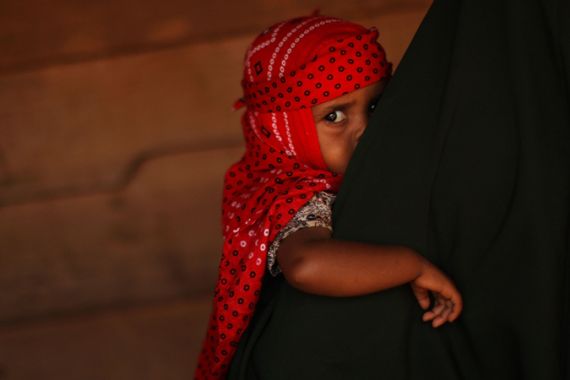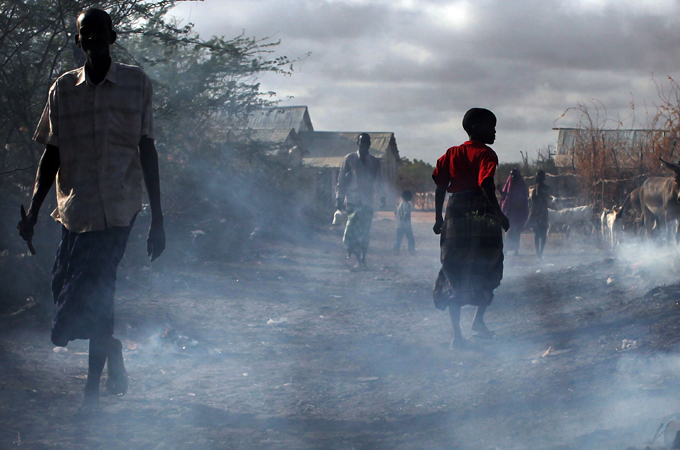Dual track policy in Somalia misses the point
The US approach to statebuilding has inadvertantly led to more clan divisions, but youth groups are pressing for unity.

 |
| Warlords and extremist groups have taken over Somalia in the absence of real progress towards statebuilding [GALLO/GETTY] |
The Obama administration’s dual track policy toward Somalia has had disturbing consequences on the efforts of building peace and a functioning state in Somalia.
US Assistant Secretary of State for African Affairs Johnnie Carson revealed the Obama administration’s long awaited US foreign policy toward Somalia in September 2010: The “dual track approach”.
According to Carson, the essence of the dual track policy is that the US would deal with central state and sub-state actors simultaneously in order to advance peace and development in Somalia.
In retrospect, the dual track policy only provides a new label for the old (and failed) Bush Administration’s approach. It inadvertently strengthens clan divisions, undermines inclusive and democratic trends and most importantly, creates a conducive environment for the return of the organised chaos or warlordism in the country.
The dual track policy is not new. Washington has often dealt with whomever it wanted in Somalia: regions, warlords, and different groups.
Continuing Bush’s legacy
The Bush administration, without formally announcing it as a policy, engaged all kinds of sub-state actors in the country, including the two stable regions of Somaliland and Puntland and some of Somalia’s most notorious warlords.
With the benefit of hindsight, it is clear now that it was counter-productive to undermine the Somali government while supporting warlords in Mogadishu, the capital, 2006. And after the warlords failed to establish authority in Mogadishu, it was expedient for Washington to ignore the Somali government and instead support the Ethiopian invasion.
Ethiopia has also pursued a similar policy toward Somalia, called the building block approach, for the last two decades. This approach, in a nutshell, did not lead Somalia into peace. Instead, it empowered extremist groups.
New or not, the unintended consequence of the Obama Administration’s dual track policy is that it sharpened already divisive clan identities in Somalia and made a sensitive political condition more volatile.
Soon after it was announced, most Somali clans and sub-clans interpreted the policy to mean that the US would only deal with clans who had regional administrations of their own. Consequently, more than 20 nominal clan-owned regional administrations have been created since the dual track policy was announced.
The rush to establish clan-owned regions has exacerbated the divisions among Somalis. For example, even members of the same sub-clan could not agree on one regional administration.
The sub-clan based region idea reinforces the concept that a given clan exclusively owns part of the country. Because of this, Somalis’ citizen-based rights and the collective ownership of the country have been damaged. There is also a well-founded fear that this may plant seeds for potential inter-clan conflict.
By now, the US must have realised that the dual track policy has sent the wrong message to Somalis.
Statebuilding and peacebuilding
For the past five years, many Somali elites realised that the way out of the current mess was by putting together an inclusive, diverse and like-minded group of people (or political party) with a national agenda -one that the dual track policy now undermines.
Recently, social forces have organised and established political parties in support of an inclusive approach.
This social and political development peaked in February 2011, when some of Somalia’s most well-known academics announced the Hiil Qaran political party. Professor Abdi Samatar became the interim chair and many credible individuals were present at the time of the inauguration.
In fact, former Prime Minister of Somalia Abdirisaq Haji Hussein, a well-respected Somali nationalist, put his weight behind this political party.
Similarly, another group of Somali intellectuals announced the Justice and Peace Party in Mogadishu and began mobilising young Somalis along an inclusive platform. Hassan Sheikh Mohamud, a member of Somali civil society, was elected to lead the new party.
Moreover, Somali youth have mobilised themselves under the Anti-Tribalism Movements and the Somali National Party (Ha Noolaato). Zakia Hussen, a Somali youth leader and the secretary general of the SNP, has publicly challenged the status quo and the elite that has failed the people of Somalia time and again.
This creation of political parties is a positive step forward because it encourages Somalis to work together. What is needed now is legislation that governs these political parties and future elections.
As positive as these developments are for Somalia, Washington’s dual track approach has slowed down the momentum toward civic nationalism in the country.
Essentially, the dual track policy is based on confusion and a poor diagnosis of the problem. It indirectly empowers warlords on one hand, while on the other giving a free hand to Augustine Mahiga, the UN Special Representative for Somalial .
It is open secret that Somalia’s notorious warlords are on the move to restore conditions that prevailed in Mogadishu prior to 2006.
Former SRSG Ambassador Oulad Abdalla – who managed the Djibouti conference – made some detrimental decisions that caused Somali institutions to become unworkable. He refused any revisions to the charter and enlarged the parliament to unmanageable 550 members.
Interestingly, Ambassador Mahiga now has carte blanche in Somalia. Like his predecessor, Ambassador Mahiga is singlehandedly managing the transition. Unfortunately, he has prescribed only cosmetic changes and quick fixes that are set to fail again.
In Somalia, granting extension or sacrificing the prime minister and the cabinet will not change much.
The best way to approach the transition is to organise an inclusive, Somali-owned national convention in which traditional elders, civil society and political leaders are able to improve current institutions, adopt a constitution and elect leaders (parliament).
This is feasible if there is a political will. Such a convention could be held in Mogadishu, Garowe, Galkayo, Somaliland (if the Silanyo administration is willing to host) or even in Uganda.
The Obama administration must support the forces and activities that are working to rebuild a national state in the country, not clan-owned fiefdoms. Insecurity will reign as long as there is no sufficient and professional national security force.
That being said, Somalis, regardless of the region in which they live, need and appreciate American assistance. Back in 1990s the US led Operation Restore Hope rescued hundreds of thousands of people in Somalia from starvation.
In sum, Washington must come up with creative and comprehensive policy that addresses structural challenges, advances aspirations of the people and contributes to the peacebuilding and statebuilding in the country.
Secretary Carson explicitly said that if the dual track policy does not acheive this it will be revised.
The dual track policy is obviously counter-productive and therefore, should be changed.
Afyare Elmi teaches at the International Affairs Department at Qatar University and he is the author of Understanding the Somalia Conflagration.
The views expressed in this article are the author’s own and do not necessarily reflect Al Jazeera’s editorial policy.
